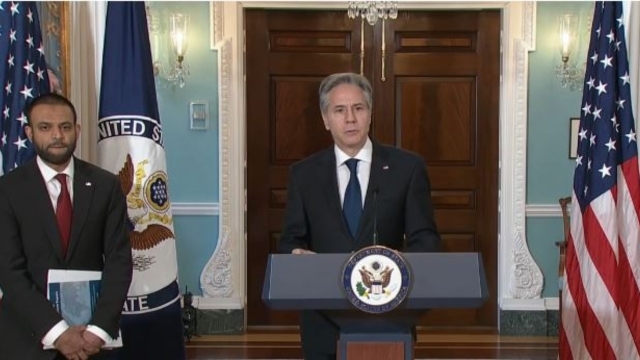A masterful description of the wrongdoings of China, Russia, Iran, and Pakistan is accompanied by some understatements on FoRB violations by U.S. political allies.
by Massimo Introvigne


As a magazine that started its publications in 2018 covering, originally, only Chinese issues, “Bitter Winter” reads every year with admiration and gratitude the section on China of the U.S. Department of State report about religious freedom. Always a comprehensive document, it does not have an academic approach but it is fair to say that it rivals the best academic treatments of religion in China for its richness of information and depth of analysis. The 2023 report, covering the year 2022, notes that the situation of freedom of religion or belief (FoRB) in China is further deteriorating with respect to all religions, from Tibetan Buddhists and Uyghur and other Turkic Muslims in Xinjiang to Catholic “conscientious objectors” and house church Protestants.
It also correctly notes that, “The government continued its campaign against religious groups it characterized as ‘cults,’ including the CAG [Church of Almighty God] and Falun Gong, and it conducted propaganda campaigns against ‘xie jiao’(literally ‘heterodox teachings’) aimed at school-age children. Human rights advocacy groups said the regime increasingly classified as ‘xie jiao’ any group the CCP perceived as hostile to the regime, and courts increasingly applied anti-xie jiao punishments to groups that were not on the official list [of the xie jiao].”
In particular, the document quotes the annual report by The Church of Almighty God to note that “during the year, authorities arrested thousands of its members and subjected some of them to forced indoctrination, physical abuse, including beatings, sleep deprivation, and being forced into stress positions, resulting in the death of at least 14 individuals.”
If all this sounds familiar to readers of “Bitter Winter,” it is also because, as it did in previous years, the Department of State report’s section on China quotes our magazine in almost all subsections and relies on dozens of our articles. Perhaps more importantly, the report does not only quote “Bitter Winter” as a trusted source for specific facts and incidents, but also shares key elements of our analysis of the dire situation of religious liberty in China.


We are also happy that our comparatively young section on FoRB problems in countries other than China is also becoming a source for the report, as we are quoted in the sections on Germany (about the disrciminatory “sect filter”) and on Russia as well. We agree with the report that the situation in Russia is also worse than in the previous years, and Russian “authorities continued to investigate, detain, imprison, torture, physically abuse persons, and seize their property because of their religious belief or affiliation or membership in groups designated ‘extremist,’ ‘terrorist,’ or ‘undesirable,’ including Jehovah’s Witnesses, the Mejlis of the Crimean Tatars, Hizb ut-Tahrir, Tablighi Jamaat, followers of Turkish Muslim theologian Said Nursi, the Church of Scientology, Falun Gong, and multiple evangelical Protestant groups.”
The authors of the section on Pakistan chose to rarely mention specific sources, often generically stating that information came from “human rights organizations” and watchdogs. We did recognize items of news for which “Bitter Winter” was the only or the first Western source. Again, this is less important than the fact that we find in the report an authoritative confirmation of our assessment of Pakistan as a country where members of minority religions, including Ahmadis, Hindus, and Christians experience “cruel, inhumane, or degrading treatment, and illegal confinement due to their faith.” And there are many other excellent sections of the report, including the one on Iran, with precious details on the “systematic persecution” of members of the Baháʼí Faith.


As friends and admirers of the desks and departments of the U.S. Department of State compiling the yearly report, we may perhaps be allowed to include in our review some critical remarks. The world in 2023 is not the world of 2022. Something changed, as democratic countries should now face the war of aggression waged by Russia against Ukraine and the renewed threats of China against Taiwan. The U.S. Department of State is not an NGO. It is about politics, and it is understandable that, even when it comes to FoRB, the distinction between countries perceived as enemies or competitors and these that are allies of the United States is taken into account.
Yet, 2022 saw some very serious problems of FoRB in democratic countries as well, confirming the analysis of most specialized scholars that no country is immune from the virus of religious intolerance. This is particularly true for groups unfairly stigmatized as “cults,” on the basis of an anti-cult ideology whose roots and basically fraudulent nature were exposed by the USCIRF, the United States Commission on International Religious Freedom, in 2020.
Considering the political context, reading through the lines one understands that FoRB problems also exist in allied countries, but statements are not always as forceful as they should be. The most important example is Japan, where in 2022 former Prime Minister Shinzo Abe was assassinated by a man who stated he wanted to punish him for his friendly attitude to the Unification Church, now called Family Federation for World Peace and Unification.
The assassin claimed that in 2002 his mother, who is still a member of the Family Federation, went bankrupt for her excessive donations to the religious movement. An unprecedented campaign of slander against the Family Federation followed, which extended to other groups stigmatized as “cults,” including the Jehovah’s Witnesses, and resulted in laws and regulations limiting religious movements’ freedom to collect donations and socialize the children of their members into their religion.
The report mentions that, “In September and October, Coordination des Associations et des Particuliers pour la Liberté de Conscience, (CAP-Freedom of Conscience), a Paris-based NGO, submitted a series of statements to the UN Human Rights Committee that said that the Unification Church had become a victim of ‘a campaign of intolerance, discrimination, and persecution’ in Japan since Abe’s assassination. The church stated its members suffered attacks, assaults, and death threats as a result of negative media attention.” It also mentions FoRB concerns about the new regulations.


However, it gives equal coverage to the typical anti-cult position that the attack against the Family Federation and the Jehovah’s Witnesses “was not about religious freedom” but about “harm” caused to members and society. It also mentions the public testimonies of certain “apostate” ex-members of the stigmatized groups, ignoring that the story of the most visible among such “apostates,” ex-Family-Federation member Sayuri Ogawa (a pseudonym), has been debunked as largely false by an independent and award-winning Japanese journalist.
We do not believe that anti-FoRB and pro-FoRB position should be considered as equally respectable in a report about religious liberty. Frankly, we would have preferred a coverage of the Japanese situation consistent with the traditional American position that regards stigmatization of certain groups as “cults” as bigotry, a position reiterated on the sections on Russia and China of the same 2023 report.
Another case of an ally of the United States that receives a “soft” treatment for its FoRB violation is France. The report does mention objections to the law on “separatism,” accusations of Islamophobia raised against the authorities, and the cavalier treatment of the Jehovah’s Witnesses by the French governmental anti-cult agency MIVILUDES.
It states that, “Jehovah’s Witnesses reported that the president of the Interministerial Mission of Vigilance and Combat against Sectarian Abuses (MIVILUDES) appeared on a podcast in May that featured what the Witnesses described as ‘demonstrably untrue’ information about the Witnesses. The Ministry of Interior posted the podcast on its website, and other government offices retweeted the account. In November, the ministry posted a statement from Jehovah’s Witnesses detailing their objections to the content in the podcast. In their annual report, Jehovah’s Witnesses also stated that MIVILUDES did not meet its legal obligation to disclose the information based on which the agency labeled Jehovah’s Witnesses a ‘sect,’ which carries a negative connotation in French. Jehovah’s Witnesses further stated that MIVILUDES’ annual report describing ‘sectarian aberrations’ was based on anonymous complaints which underwent little or no objective investigation.”


The report also mentions that, “On March 23, the mayor of Saint-Denis signed a permit allowing the Church of Scientology to renovate a building it purchased in the municipality to convert it into its headquarters and a training center. In December 2021, a court ruled that a municipal decree refusing such permission was a ‘misuse of power.’” However, it reports, incorrectly, that in France “The Church of Scientology has the status of a secular, rather than religious, association.”
The critical comments are acknowledged, but they are somewhat mild considering the systematic problems with the anti-cult mission MIVILUDES and French sponsorship of private anti-cult associations that constantly violate religious liberty. The harassment of Scientology and the Jehovah’s Witnesses in France goes well beyond the incidents mentioned, and several other groups have been unfairly targeted.
Finally, while we understand the need to protect and support Taiwan, we find the document’s statement that “There were no reports during the year of significant societal actions affecting religious freedom” somewhat strange. I led in April a delegation who visited Taiwan, participated in conferences in four different universities, and visited the Control Yuan and the Legislative Yuan, meeting with the leaders of these two bodies. Both academic and political leaders were very much aware of the tax issues affecting certain religious and spiritual movements and of the Tai Ji Men case, to which dozens of studies and articles have been devoted in international specialized media and academic journals. The choice not to mention at all the Tai Ji Men case is difficult to understand.


As mentioned earlier, these comments do not have the aim of discouraging anybody from reading and regarding as a precious resource the many excellent and even outstanding sections of the report. As from the indulgence we regard as excessive towards certain countries that happen to be key U.S. political allies, we can only hope it is a temporary phenomenon due to the war in Ukraine.









